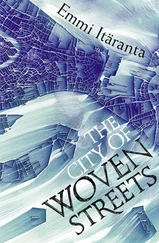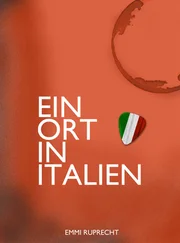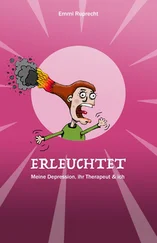I stepped forward again.
The sound tore through the air and sand spilled on my foot where the bullet reached the ground. I raised my eyes and saw movement perhaps ten metres away: a strip of blue among the tree-trunks, the stabbing glint of metal where sunrays hit it.
My third attempt confirmed what I had begun to suspect. Sand scattered again, just close enough to be an effective warning, but purposefully beyond my outlines. These soldiers knew how to shoot, and they wanted me to know my limits. Nevertheless it seemed that for some reason it wasn’t their intention to hurt me.
A suffocating silence weighed on the landscape, when I slowly backed into the garden through the gate.
When the sun turned to afternoon, I had discovered the boundaries of my captivity. They followed the garden fence everywhere except behind the teahouse, where there was no fence. The invisible wall had been raised approximately ten steps away from the back wall of the teahouse, but I was free to go into the teahouse itself. I concluded that there must be several crackshots in the immediate surroundings of the house, constantly following my movements.
After returning into the house I locked the door and drew all the curtains in every window. I understood now why the windows of the other houses marked with a blue circle had always been covered. When life is chained within narrow limits, the slightest illusion of freedom is valuable. The weathered wood of the door and the fragile glass of the windows would not keep away those who were threatening me, but if I could still hide one small slice of my life from them, make it mine alone, I would not give up this shred of privacy, possibly the last one I had.
I remembered the message-pods. One of them was still where I had packed it in order to take it to the Lost Lands. The other one I had left in the wooden box in my room. I pulled the hacked pod from my bag, placed my finger on the screen and waited for the light to switch on. A row of dots flashed on the display: the device was looking for a connection to a pod network. Eventually the message No network appeared on the screen. I chose the option Search again under it. A minute later the same message reappeared. I walked into my room and dug up the other message-pod. Its screen told me likewise that there was no network in the house. Those keeping me captive had seen to it that I had no way of communicating with the outer world.
Towards the evening I began to get worried about food. I had water, at least for now. I’d filled all my skins from the kitchen tap in case the supply would be cut. There wasn’t much in the way of eating, however. Looking forward to the journey, I had laden the helicarriage with everything that would last longer than a day. In the kitchen cupboard I found a few amaranth crackers and ate one of them with weak tea. I was grateful for the garden; the berries, vegetables and fruits were ripening. However, most of them wouldn’t be edible until several weeks from now. I had enough porridge flakes maybe for a week, if I used them sparingly.
When the sun had dropped as low as it would tonight, I searched the kitchen drawers for a thick-bladed knife. I stood in front of the closed front door. A long time ago, a two-forked metal coat rack had been nailed to the door. I usually hung my insect hood from it. I moved the hood to the shelf on the wall and placed the tip of the knife against the wood, which was painted white. I discerned in the paint brush-strokes, the movement of my mother’s hand: she had scraped off the old paint, made the door look shiny and new again. Over ten years had passed since, and the paint was cracked.
I pressed the blade hard against the door and drew one vertical line on the wood, on my side, the reverse of the blue circle. The paint peeled away under the cut. There was still plenty of space for other lines.
Back in my room I pushed the knife under my pillow. I lay with the light of late summer on my face, the message-pods dark and mute on the table next to my bed.
In the morning I drew another vertical line next to the first one. The air in the house seemed suffocating and stuffy. When I opened the door, I saw a trayful of food had been left on the veranda steps. There wasn’t a lot of it: half a loaf of bread, a handful of dried figs, a small pouch of beans. I placed them to soak in a bowl of water and divided the food carefully into rations, because I didn’t know how many days I would need to survive on it. The empty tray I left where I had found it.
I thought of the water running from the kitchen pipe when it shouldn’t have been, and of the crackshots who deliberately aimed their shots right next to me, but missed. I thought of the food left on the veranda. I began to feel certain of what I couldn’t understand: somebody wanted to keep me alive, at least for the time being.
They also wanted me to be afraid.
The following night I kept watch at the window in order to see if anyone came into the garden. The soldier arrived a little after six o’clock in the morning. He was carrying a tray with a portion of food on it. When he placed it on the veranda steps, I got up despite the tiredness weighing my limbs. He raised his gaze when I opened the door.
‘Why is my house marked?’ I asked.
The soldier picked up the empty tray and didn’t answer. He turned around and started walking away. I went after him. I understood it was not a safe thing to do, but I had to try.
‘What am I being accused of?’ I asked. ‘Couldn’t I speak to somebody?’
The soldier continued to walk without a word. I made a sprint to overtake him and blocked his way. He stopped and placed a hand on the hilt of his sabre. I only realised now that he was the baker’s son I had gone to school with and seen in the village painting posters.
‘Let me speak to somebody,’ I said. ‘If I must live in captivity, I want to know what I’m being accused of, at least.’
He stood there, tense, and I waited for the cold-burning cut of the sabre on my skin. He still didn’t speak.
‘Please,’ I said and hated my own pleading tone of voice. When he didn’t reply, I asked, ‘Why are you doing this?’
His hand remained on the hilt when he said, ‘You’re not permitted to talk to anyone, and I don’t have the answers to your questions. I’m only doing my job.’ He went quiet and observed me, and for a moment I saw in him the boy I had seen running fast on the schoolyard between the classes for years, never paying much thought to him.
‘I should slash your face,’ he continued, ‘but I’ll let it go this once. The other guards may not be as kind. It would be wiser to stay in the house when the food is being brought.’
He started towards the gate again. I stood in my place, because his voice and expression had turned my tongue into stone and rooted my feet into the ground. I had seen a darkness behind his eyes that frightened me: a darkness born not only of things one has had to see despite wanting to look away, but a denser, more pungent one.
A darkness born when one does things from which others want to look away.
I knew with utter certainty that if I followed him or spoke to him again, he would slash me with his sabre and leave me bleeding until I would move no more. I watched him disappear through the gate between the trees, and only many moments later my blood flowed light enough that I could return into the house.
On the evening of the third day I was standing by the rock garden, when I saw movement on the road coming from the village. From the distance I could tell the figure was moving on foot and not wearing a blue uniform. She seemed too short to be Sanja. The figure moved closer, blended with the shadows of the trees, and no one stepped out to cut her way. As she drew nearer to the gate, I recognised her as Mai Harmaja. Approximately ten metres outside the gate she stopped in her tracks and stared at the house. Her eyes shifted and hit me, then her head turned towards the house again, and I knew her gaze was fixed on the door. A moment later she looked around her, turned and started walking back towards the village with hasty footsteps.
Читать дальше
Конец ознакомительного отрывка
Купить книгу












